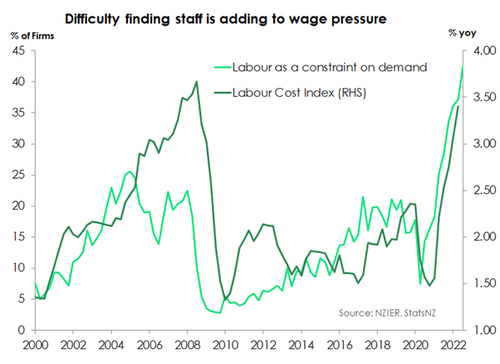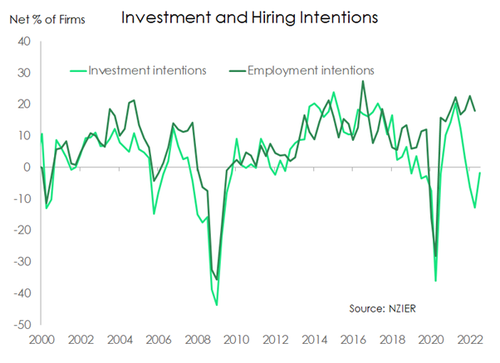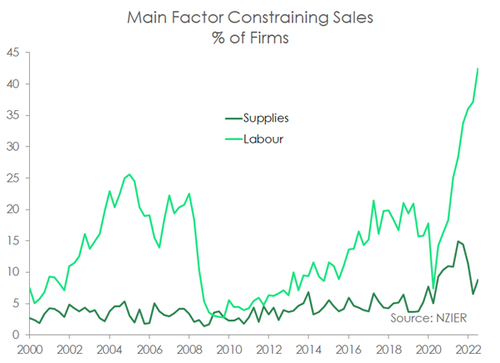
- The NZIER QSBO survey showed an improvement in business expectations. The survey bounced off recessionary levels. It was a small step in the right direction. But we are far from ‘normal’ levels. There is still a steep climb ahead.
- The NZIER survey supports many other surveys and anecdotes revealing the challenges to economic activity. Between labour shortages and the ongoing supply chain disruptions, there’s a myriad of issues weighing on firms’ activity and profitability.
- Firms are operating in a tough environment with heightened uncertainty. The growing consensus is that the current climate is not ideal for expanding business. Investment intentions remain negative, but hiring intentions are holding up.
Business confidence bounced off the bottom in the September quarter according to the latest Business Opinion survey from NZIER. A net 42% of firms see general business conditions deteriorating in the coming six months. An improvement on the net 62% back in Q2 – a level that plumbed the lows of the GFC. Domestic trading activity also lifted in the quarter, firms perhaps breathing a sigh of relief that the worst of covid is behind us and the border fully reopened in the quarter. But measures of activity remain well below QSBO average levels and suggest a period of below trend growth lies ahead. Below trend growth is welcomed by the RBNZ, as it tames inflation. Demand has exceeded the economy’s ability to meet it for too long and balance needs to be restored.
The latest QSBO showed that while inflationary pressure in the economy eased in the quarter, it remains uncomfortably high. A net 74% of firms experienced rising costs in the period. And 65% of firms plan on hiking prices as a result, albeit down from 76%. Both measures sit well above the survey average and indicate only a gradual fall in inflation is likely. Although the survey supports our view that CPI inflation peaked back in the June quarter.
Much of the cost pressure experienced by firms continues to emanate from the labour market. Demand for labour is holding up
well, all things considered. A net 13% of firms intend on lifting headcount in the coming quarter. As a result, finding staff  remains a bugbear for NZ businesses. There remains a net long-term outflow of people from Aotearoa, which is adding to the difficulty in finding staff. And we don’t expect a net migration inflow to occur until next year as the flow of people across our border takes time to normalise. Skilled labour shortages are particularly acute in industries such as construction. The main outcome is rising wage growth.
remains a bugbear for NZ businesses. There remains a net long-term outflow of people from Aotearoa, which is adding to the difficulty in finding staff. And we don’t expect a net migration inflow to occur until next year as the flow of people across our border takes time to normalise. Skilled labour shortages are particularly acute in industries such as construction. The main outcome is rising wage growth.
Investment intentions lifted a touch too. But a net 2% of firms expect to invest less in plant and machinery. And a net 17% expect to invest less on buildings. The lack of investment intentions continues to hinder the outlook. A decline in investment kills growth.
Today’s update supports many other surveys and anecdotes revealing the challenges to economic activity. Between labour shortages and the ongoing supply chain disruptions, there’s a myriad of issues weighing on firms’ activity and profitability expectations. The actions the RBNZ has taken in its quest to rein in 30-year high inflation is clearly making an impact. As interest rates are being jacked-up, signs of slowing demand are emerging. However, we don’t think falling confidence will dissuade the RBNZ from easing up on its tightening pace yet. We expect the cash rate to be lifted by another 50bps at tomorrow’s MPR, and again in November to end the year with a 4% cash rate.
Holding off
 Firms are operating in an environment of rising borrowing costs, elevated cost pressure, and weakening consumption. The growing consensus among firms is that the current climate is not ideal for expanding business.
Firms are operating in an environment of rising borrowing costs, elevated cost pressure, and weakening consumption. The growing consensus among firms is that the current climate is not ideal for expanding business.
Supply-side issues remain at the core of the growing pessimism across firms. And top of the list is the difficulty in finding skilled labour, with a net 58% of firms experiencing the issue first-hand. The problem is especially acute for the building sector, with 73% of firms reporting labour shortages as the main constraint on business. The pool of available talent is quickly evaporating. Unfortunately, conditions may get worse before they get better. We see a net 15-20k people emigrating from NZ by the end of the year. With relatively fewer people booking one-way tickets to NZ, the net outflow will only add further stress on the labour market.


